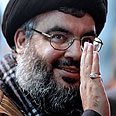
Nasrallah hails Hariri's visit to Damascus
Lebanese PM calls for renewal of ties with Syria at end of a fence-mending trip to his country's former powerbroker. Hezbollah chief says visit helped make 'atmosphere comfortable' between two countries
It was Hariri's first trip to Damascus since the 2005 assassination of his father, ex-prime minister Rafik Hariri – a killing that he and his US-backed allies in Beirut blamed on Syria.
Regional commentators, including Lebanon's Hezbollah chief Hassan Nasrallah, have hailed the visit as an ice-breaker and step toward healing decades of turbulent ties between the two neighbors.
"We want privileged, sincere and honest relations ... in the interest of both countries and both peoples," the 39-year-old premier told a news conference in Damascus at the end of the landmark two-day visit.
"We want to build ties with Syria based on positive points," he added, describing his visit during which he had three rounds of private talks with Syrian President Bashar Assad as a "historic".
Syria dominated its tiny neighbor for nearly three decades until April 2005 when it pulled out its troops from Lebanon under international and regional pressure, two months after the assassination of Rafik Hariri.
The two neighbors established diplomatic ties for the first time last year, with Syria opening an embassy in Beirut, while Lebanon opened its mission in Damascus in March.
The US- and Western-backed Hariri said his unity government, which includes members of the Syria- and Iran-backed Hezbollah coalition, wanted to take measures with Damascus to develop these ties.
Assad is also "very attached to sincere relations based on common understanding" between the two countries and spoke "positively" of problems that still need to be resolved, Hariri said.
Foremost is a plan to demarcate the porous border between the two neighbors, he said.
Ice broken
Hariri, whose US- and Saudi-backed coalition clinched victory in a general election over the Hezbollah-led alliance in June, said Saudi Arabia "played an important role" in paving the way for his visit to Syria.
But Hariri stressed that he did not discuss with Assad a UN-led inquiry into his father's murder nor the Special Tribunal for Lebanon that has been set up to try the suspected killers.
"The tribunal is doing its work and this is what everybody wishes," he said.
A UN inquiry said it had evidence that Syrian and Lebanese intelligence services at the time were linked to the killing, but no charges have been brought.
Earlier this month, a Syrian court asked 25 prominent Lebanese, including individuals close to Saad Hariri, to appear for questioning over the murder.
Hariri and his US- and Western-backed allies have in the past blamed Syria for the murder and for a string of subsequent political assassinations in Lebanon. Damascus has denied any involvement.
Commentators and ordinary Syrians, meanwhile, hailed Hariri's visit to Syria.
Hezbollah chief Hassan Nasrallah said late Saturday that the visit helped make the "atmosphere comfortable" between the two countries, his office said in a statement.
Also on Saturday, Syrian presidential adviser Bouthaina Shaaban told reporters: "There is no doubt that the ice has been broken between the two sides."
For Khaled Amayri, a former Syrian soldier who served in Lebanon told AFP: "Hariri's visit is a sign of the depth of relations between Syria and Lebanon that go a long way back."
Syria's official al-Baath newspaper, mouthpiece of the ruling Baath Party, said in a front-page headline on Sunday: "Three positive, honest, friendly hours ... break the ice and end the negative phase of the past."
Samir Musalma, editor-in-chief of the government newspaper Tishrin, agreed. "The past phase has been painful ... but that does not mean we cannot move on," Musalma told AFP.










